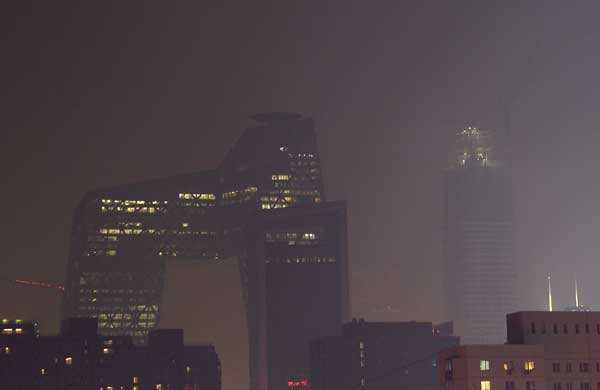
The CCTV headquarters is shrouded in heavy smog in the central business district in Beijing, China Dec 7, 2015.(Photo/Xinhua)
Sudden alert would test government's emergency response: expert
Beijing on Monday issued its first-ever red alert ahead of a new wave of air pollution in the coming days.
The city will find out if the promised "most serious" measures, including shutting down factories and banning half of the city's vehicles from the road will be fully implemented, and whether all these measures will work.
The capital city's environmental protection bureau upgraded an orange alert issued Sunday to red - the highest on a four-level scale - at 6:30 pm Monday, which will last from 7 am Tuesday to 12 pm Thursday, until an expected cold front blows away the smog.
Beijing suffered from thick smog from November 27 to December 1, which many residents claim was the worst they have ever experienced. But the government only issued an orange alert on November 29.
A red alert is issued when hazardous air pollution lasts for more than 72 hours under the nation's four-tier air pollution warning system, in which red represents the most severe conditions, followed by orange, yellow and blue.
Under a red alert, the city will resort to an odd-even license plate system, which means only half of registered vehicles will be allowed on the road.
Schools will be advised to close, while companies may adopt a flexible schedule under a red alert, which also bans activity at construction sites, transport of materials and waste, as well as firecrackers and outdoor barbecues. Industrial plants blacklisted under the red alert would be shut down.
Mixed reaction
The decision was received with mixed feelings by the public.
"Greenpeace is delighted to see an active and timely issuance of red alert, which we believe is also closely linked to the environmental protection ministry's measures from top to bottom," Dong Liansai, a Greenpeace air pollution observer based in Beijing, told the Global Times, suggesting that schools shut down on less severe alerts as well to protect the children.
Meanwhile, many netizens said the "flexible work schedule" under a red alert would still mean going to work in the smog, while teachers and parents reached by the Global Times are concerned about the impact of the disruption to classes.
Analysts said the sudden alert would test how prepared authorities are during an emergency.
An anonymous media officer at Beijing's transportation management bureau told the Global Times Monday that they also learned of the alert "out of the blue," and discussions continued at their conference before a detailed plan was issued.
Wang Gengchen, a research fellow at the Institute of Atmospheric Physics of the Chinese Academy of Sciences, said that China's technology is capable of pollution detection and monitoring, but the problem lies in the implementation of related policies.
Some blacklisted companies might continue to operate despite the restrictions, which requires stricter law enforcement as well as greater public supervision over such practices, Wang told the Global Times.
"A red alert may have a limited impact on cutting the level of pollutants in Beijing, as many pollutants are transmitted from neighboring regions and Beijing seldom ranks among the top 10 most polluted cities in the region," Ma Jun, director of the Beijing-based NGO Institute of Public Environment Affairs (IPE), told the Global Times.
Seven cities in neighboring Hebei Province on Monday also announced emergency measures in the coming days, including limiting the number of vehicles on the road. But few said they would close their factories.
The Ministry of Environment Protection (MEP) has identified the sources of pollution in nine major cities prone to air pollution, the Xinhua News Agency reported Monday. The report said vehicle exhaust is Beijing's top source of pollution, while Shijiazhuang, Hebei Province, suffers air pollution mostly from burning coal. The MEP said it will completely identify the sources of pollution in all provincial capitals by the end of 2015, Xinhua reported.
Beijing's pollution alert system
Blue alert
No mandatory measures
Yellow alert
Maintenance workers to clean up key roads and reduce traffic dust
Construction sites are banned from demolitions or operations on big blocks of materials
Orange alert
Construction sites must stop operations and strengthen dust control
Factories on orange alert list must stop operations or limit activity
Trucks carrying construction materials are banned from the road
Fireworks and barbecues are banned
Red alert:
Only half of the city's vehicles are allowed on the road using odd-even license plate scheme
Trucks carrying construction materials are banned from the road
Construction sites must cease operations
Factories on red alert list must stop operations or limit activity
Fireworks and barbecues are banned


















































